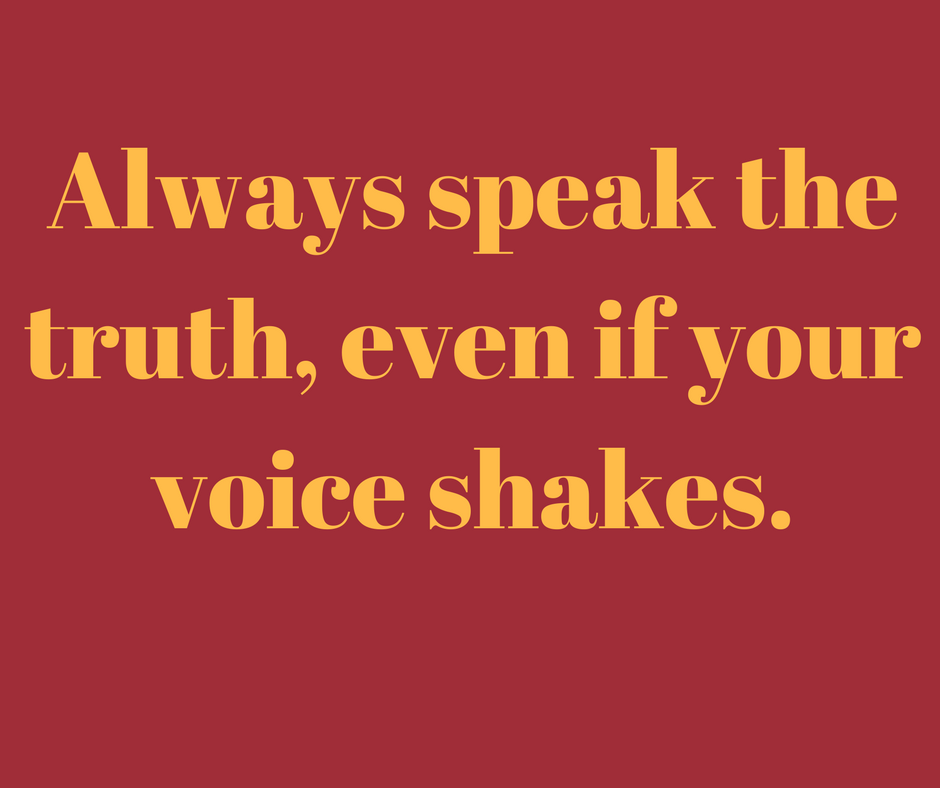
Trusting myself has always been a struggle. I can’t remember a time growing up when I actually trusted myself more than I trusted those around me. I somehow thought that others knew more than I did. That I was somehow flawed. Telling my truth and living my truth was scary! It was so scary that I didn’t really even know what “my truth” was most of the time.
Like most kids, I needed to feel safe and secure growing up, but I really didn’t. I know now that being safe and secure is being able to say my truth, without feeling threatened.
~ Excerpt from my new book, “Quandary to Clarity”, Pamela Brown Wilkinson
Telling your truth can be pretty scary. As you can see above, I have not always been very good at it. In fact, I still struggle with this every day. What I have learned though, as an adult, is that telling my truth is not only a good idea, it is paramount. The consequences of not telling my truth range far and wide, from losing a friend to losing respect for myself.
We have all heard that in order to be loved and to love someone else, we must first love ourselves. And we know that honesty is necessary to cultivate a good, long-lasting relationship. In addition, trust and respect figure into the equation. Without honesty there can be no trust. Without trust, there can be no honesty, nor can there be respect. It is a triumvirate – each piece equally important and each part dependent upon the others.
There is an important distinction to make between “telling our truth” and “giving our opinion”. Many people believe that their opinions are the truth. But, unfortunately, our opinions often arise from making a judgment about something outside of us. For example, let’s imagine that I think Sally is rude. That is my opinion. It is NOT the truth. In the words of Mike Robbins:
When we let go of being “right” about our opinions and take responsibility for our experience, we can speak our truth from a much deeper and more authentic place. Speaking this deeper truth will not only liberate us, but has the potential to make a difference for others while bringing us closer together.
Mike Robbins goes on to give us three ways we can begin telling our truth more often:
- Stop managing other people’s feelings. I know this one well, as I can be the king of trying to manage other people’s feelings. It’s arrogant, manipulative and somewhat ridiculous to think we have the power to manage other people’s emotions. We also use it as a cop-out to not really speak our truth. We can be aware and mindful of other people and how they might feel (so we don’t end up being mean and hurtful on purpose), but when we let go of taking care of others in a condescending way, it frees us and them up to be grown-ups and have adult conversations, which sometimes can get a little sticky or tense when we’re speaking our truth.
- Be real, not right. This is huge when it comes to speaking our truth. When we focus on winning or being right, we no longer can access the deepest places within our heart, which is where our real truth comes from. When we let go of our attachment to the outcome of a conversation, what the other person thinks and our erroneous obsession with always having to be right, we give ourselves the opportunity to get real. Being vulnerable and transparent are the key elements of speaking our truth, not dominating the conversation and the person (or people) we’re talking to.
- Practice. Like anything and everything else in life, the best way for us to get better, deepen our capacity and grow is to practice. In this case, as we’re talking about speaking our truth, it’s not about role-playing per se (although if that helps give you the courage to have a difficult conversation, go for it). It is about speaking up and stepping into your life with your truth. Will you mess it up? Of course! Will you say the wrong things sometimes? Yes. Will people get upset, offended or defensive at times? Absolutely. This is not about being perfect, it is about being yourself and speaking authentically.
Most all relationship problems comes down to a lack of one of three key foundation values: honesty, trust, and respect… and a willingness to end a relationship when it’s clear that one of these is missing. They are critical not just for romantic relationships, but all relationships… from teacher/student, parent/child, between friends, to between colleagues. All.
~ From “Honesty, trust, & respect: the foundation values of all relationships”; Quixotic Kiwi
The only reason I can come up with to justify not telling the truth is if doing so would put you at risk. If your wife or husband is abusive, for instance, you may be justified in keeping the truth to yourself. Ultimately, though, it would be best to remove yourself from any situation in which you don’t feel safe enough to tell your truth.
Authentic Living Newsletter Subscription
Let me know your thoughts on this!